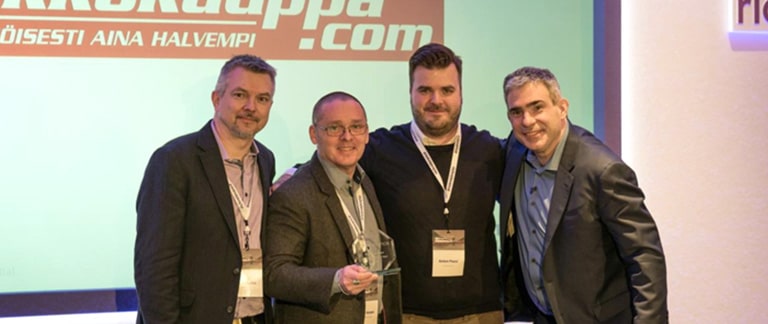Leader in AI-driven personalization to host session on Digital Innovation at B2B Online conference in Chicago
San Francisco, CA – April 29, 2019 – RichRelevance, the global leader in Experience Personalization, today announced that brands, manufacturers and wholesalers are increasingly embracing RichRelevance’s AI-driven Hyper-personalization to complement traditional sales channels and drive digital revenue growth. RichRelevance’s comprehensive B2B personalization solution allows B2B leaders to simplify, guide and help their customers navigate complex buying processes as research and purchasing increasingly shifts online. With RichRelevance, B2B leaders can use proven technology to meet and exceed buyer expectations for a self-service, consumerized experience that is both memorable and relevant.
In a time of choice abundance, poorly targeted marketing is not enough to satisfy increasingly demanding shoppers. To earn their loyalty, brands and retailers need hyper-detailed alignment with their needs.
Ask any marketing professional, selling online is getting increasingly challenging. Today’s shopper is rich in options. However, between Amazon and Alibaba alone, shoppers are certain to find exactly what they need, provided they are willing to trawl through page after page of cut-price products. In a world dominated by e-commerce giants, smaller e-tailers are increasingly asking “How can I compete?”
At the RichRelevance personalization summit in February we celebrated some of our most innovative customers in our personalization awards. One of these awards, Best Omnichannel Personalization Initiative, rewarded the retailer who made significant in-roads into connecting sales channels to improve the customer experience. Which we know is easier said than done.
At our recent Personalization Summit, RichRelevance recognized several customers who are innovating in Personalization with awards. One of the award categories recognized retailers who have shown the greatest initiative to engage in personalization best practices, optimizations and/or testing initiatives.
Segmentation is a fairly age-old approach to personalize marketing campaigns. Segmentation basically is grouping individuals into ‘buckets, called segments based on pre-determined interests, geography and/or demographics. For example, in grocery, a segment might be defined as “People over 50 who typically spend £50 a week in-store” or “Families with children under 5,” etc. Segmentation used to help marketers cope with the abundance of data and plethora of consumers, and allow them to “personalize” experiences at scale. The one problem with this is segmentation is never a truly personal experience.
It Turns Out the Joke Is on Us
One the of the great cosmic jokes we almost all struggle against as we get older is the belief that the following generation had an easier time of it than ours. While the reality is that each new generation has its own context that really can’t be compared to the one that came before or after, I’m starting to think that the current business climate might just be the exception.
At this year’s EMEA Personalization Summit we rewarded RichRelevance customers who are leading the way in personalization through data science, testing and innovation.
One of the most prestigious awards was for Personalization Innovator of the Year, which recognized the retailer who has demonstrated the most forward thinking initiatives and differentiated, innovative ideas in personalization that drove key performance indicators for the business.
MAKING THE LEAP TO HYPER-PERSONALIZATION
One trend continually on the rise is shopper dissatisfaction with what once passed for personalization. More so than ever before, your customers want and even demand that you know them better, understand their individual needs, and inspire them to continue shopping. The time has come to rethink personalization by making the leap to Hyper-Personalization. With Hyper-Personalization, and the new features launched in support, we allow you to take the next evolutionary step and do what the marketing clouds and rest of the personalization industry can’t: deliver real-time personalized and shoppable experiences at the individual level.







